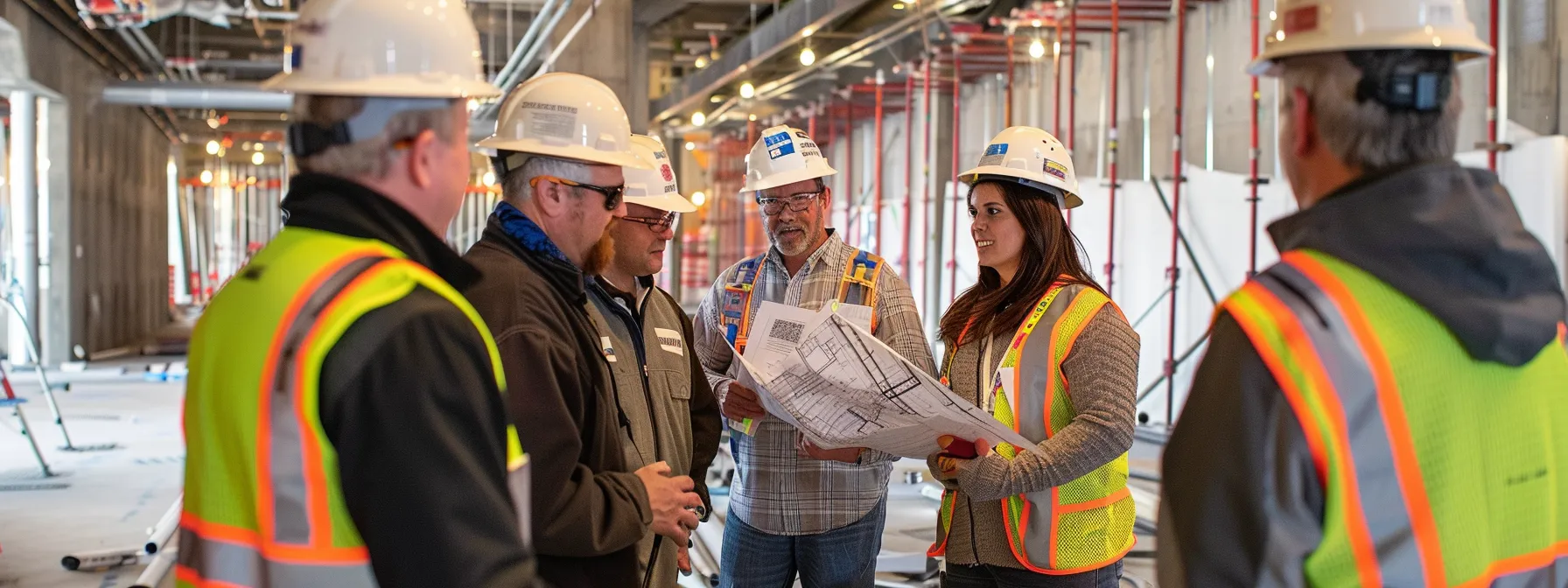Are you struggling to connect with potential clients in the construction industry? Recent content marketing statistics show that effective strategies can significantly boost your visibility and client engagement. This post will explore how to harness the power of content marketing in construction, create compelling content that resonates with your audience, and amplify your efforts […]
Are you struggling to connect with potential clients in the construction industry? Recent content marketing statistics show that effective strategies can significantly boost your visibility and client engagement. This post will explore how to harness the power of content marketing in construction, create compelling content that resonates with your audience, and amplify your efforts using digital platforms. By addressing user intent and leveraging influencer marketing, contractors can better reach their ideal clients. Stop wasting time and resources—this guide will help solve your marketing challenges and drive results.

Content marketing is essential for construction businesses, as it enhances visibility while driving business growth. It helps in differentiating a brand through valuable content that speaks directly to potential clients. By aligning content strategy with organizational goals, contractors can effectively use newsletters and other forms of content creation to engage their audience and increase conversions.
Content marketing is crucial for construction businesses as it builds brand awareness and credibility. By leveraging storytelling techniques, contractors can share their experiences and project successes, making them more relatable to potential clients. This approach not only enhances engagement but also guides prospects through the sales funnel, increasing the likelihood of conversions.
Incorporating data analysis into content strategies allows construction professionals to understand audience preferences and tailor their messaging accordingly. For instance, using analytics can highlight which content types resonate most with clients, enabling contractors to produce targeted material that addresses specific pain points. This not only fosters trust but also positions the brand as a knowledgeable leader in the industry.
Content marketing drives business growth by enhancing online visibility for construction professionals. By effectively using SEO strategies and tools like Hootsuite, contractors can optimize their content for search engines, ensuring their services reach potential clients searching online. Additionally, allocating a dedicated content marketing budget allows businesses to invest in high-quality graphics and valuable content that resonate with their target audience, thereby increasing engagement and brand recognition.
Moreover, integrating analytics into content strategies can significantly impact a construction business’s growth. By analyzing performance metrics, professionals can identify which types of content yield the best results and adjust their marketing efforts accordingly. This data-driven approach not only saves resources but also leads to more effective campaigns that address client pain points, ultimately boosting conversions and fostering long-term client relationships.
Creating valuable content is key for construction professionals looking to differentiate their brand in a competitive market. By effectively utilizing multimedia formats such as video production, contractors can showcase their projects and expertise in dynamic and engaging ways. Adding these videos to a well-structured landing page can enhance user experience, helping potential clients connect with the brand on a personal level and making the company memorable.
Incorporating a strategic editorial calendar can streamline a construction company’s content marketing efforts across various social media platforms. Posting regularly and sharing diverse content types—like project highlights, client testimonials, and industry insights—ensures a comprehensive approach that resonates with audiences. This not only boosts engagement but also positions the contractor as a trusted authority in the construction field, ultimately driving more inquiries and potential business growth.
Aligning a content strategy with business goals is crucial for construction professionals aiming to become thought leaders in their field. By focusing on the specific needs and challenges of their target customers, contractors can develop a content management system that produces relevant content formats, such as blogs, videos, and case studies. This strategic alignment ensures that the messaging not only informs but also resonates with potential clients, ultimately driving engagement and conversions.
Moreover, establishing clear objectives enhances the effectiveness of content marketing efforts. For instance, if a contractor aims to increase brand awareness, they might invest in diverse content formats that tell their brand story and highlight successful projects. By consistently measuring the impact of these efforts against defined business goals, construction professionals can refine their strategies and stay relevant in a competitive market, reinforcing their reputation as industry leaders.
Content marketing lays the groundwork for success in construction. Next, learn how to attract the right clients with focused content that speaks directly to their needs.

Identifying the construction industry’s audience is vital for tailoring effective content marketing strategies. Understanding client needs and challenges lays the foundation for developing detailed buyer personas. By creating content that resonates with stakeholders, contractors can enhance their copywriting skills while optimizing their publishing efforts for search engine optimization. Each of these elements plays a crucial role in capturing attention and driving engagement.
Identifying the construction industry audience involves understanding the specific needs and preferences of potential clients. Professionals can leverage tools such as market research and client surveys to gather insights about consumer behaviors and expectations. By focusing on demographics and specific challenges, contractors can create tailored marketing materials, including ebooks and guides that highlight their expertise in project management.
Effective content marketing strategies require creativity and careful editing to resonate with the target audience. Contractors can utilize data analysis to identify what content formats engage clients most, ensuring that their messaging addresses common pain points. This focused approach not only builds trust but also positions the contractor as a reliable partner in the eyes of consumers, ultimately encouraging client engagement and fostering long-term relationships.
Understanding client needs and challenges is crucial for construction professionals aiming to engage their ideal clients. By utilizing resources like social media analytics, contractors can gather insights on client preferences and behaviors. This information facilitates the creation of targeted content, such as infographics that outline services and solutions tailored to specific audience concerns, ultimately driving brand awareness and fostering trust.
When contractors recognize the common challenges faced by their clients, they can develop content that directly addresses these pain points. Providing valuable resources, such as case studies and this year’s developments in the industry, positions the contractor as a reliable partner, enhancing brand loyalty. By consistently delivering relevant and useful information, these professionals not only satisfy their clients’ immediate needs but also establish lasting relationships built on understanding and support.
Developing detailed buyer personas is essential for construction professionals aiming to enhance their reputation in the market. By conducting thorough research and analysis, contractors can gather statistics on client demographics, preferences, and pain points. This understanding allows them to tailor their content and marketing channels effectively, ensuring that messages resonate with their ideal clients.
An expert approach to crafting buyer personas involves identifying specific traits and behaviors of potential customers. For example, construction professionals may discover that a segment of their audience prioritizes sustainable building practices. By addressing these findings through targeted content, contractors can not only attract attention but also foster trust and loyalty among clients, solidifying their status as reliable partners in the construction industry.
Creating content that resonates with stakeholders requires a deep understanding of their needs and preferences. By utilizing email marketing campaigns, construction professionals can effectively communicate relevant updates and insights that align with stakeholder interests. An audit of existing content can highlight gaps and opportunities, enabling contractors to refine their approach and clearly convey their value proposition in every message.
Implementing a robust content management system streamlines the development and distribution of marketing materials tailored to specific target audiences. By measuring the return on investment from different content types, construction professionals can focus on producing formats that generate the most engagement. This data-driven approach not only enhances the effectiveness of marketing efforts but also fosters stronger relationships with stakeholders through valuable, targeted communication.
Now that you understand your ideal clients, it’s time to focus on how to create content that speaks directly to them. Compelling content can open doors, grab attention, and drive results that matter.

Effective content marketing strategies for construction professionals require careful attention to multiple elements. Selecting effective content formats tailored to audience personas helps enhance visibility. Planning a consistent content schedule ensures regular engagement, while crafting industry-specific content with impactful insights builds credibility. Additionally, enhancing engagement with visual media and establishing authority through thought leadership positions contractors as skilled experts in their field, directly addressing their target audience‘s needs.
Selecting effective content formats is essential for construction professionals targeting specific audiences. Conducting thorough keyword research can identify which formats resonate most with potential clients, whether it’s blog posts, videos, or infographics. By aligning these formats with the overall content strategy, contractors can enhance lead generation efforts and drive more web traffic to their sites.
Social media marketing plays a significant role in choosing the right content formats. Engaging visuals and video content are often more appealing on platforms like Instagram and Facebook, attracting more audience interaction. Incorporating a variety of content formats ensures a broader reach and meets different preferences, ultimately supporting the construction business’s growth objectives.
Planning a consistent content schedule is vital for construction professionals aiming to maximize their market reach. By regularly publishing high-quality content, contractors can enhance their visibility and improve search engine rankings, making SEO Services an essential part of this strategy. A well-structured calendar helps ensure timely updates across various platforms, which keeps the audience engaged and positions the contractor as a reliable source of information in the industry.
Additionally, utilizing Social Media Management tools can streamline the scheduling process and maintain a steady flow of information. By analyzing audience engagement metrics, construction professionals can identify the best times to post content, maximizing interaction and interest. Consistency in posting not only builds brand recognition but also encourages ongoing conversations with potential clients, fostering relationships that can lead to increased business opportunities.
Crafting industry-specific content is vital for construction professionals who wish to establish authority and connect with their audience. By focusing on trending topics such as sustainable building practices or advancements in construction technology, contractors can provide valuable insights that appeal to potential clients. This targeted approach not only enhances engagement but also positions the contractor as a trusted resource, making them the go-to choice for clients seeking expert guidance.
Moreover, incorporating case studies and project showcases into content marketing efforts can effectively highlight the contractor’s capabilities and achievements. This method allows professionals to demonstrate their expertise in real-world applications, addressing client pain points directly. By communicating success stories and detailing problem-solving strategies, construction professionals can create a compelling narrative that resonates with prospective clients, ultimately driving inquiry and business opportunities.
Visual media plays a crucial role in enhancing engagement for construction professionals. High-quality images and videos can showcase completed projects, emphasizing craftsmanship and attention to detail. By using visual elements on websites and social media platforms, contractors can capture the attention of potential clients, making their services more appealing and memorable.
Incorporating visual content, such as project tours or time-lapse videos, allows construction companies to convey their expertise effectively. These formats can illustrate complex processes in an engaging manner, helping potential clients understand the value of their offerings. By prioritizing visual media, contractors can create a compelling narrative that resonates with their audience, encouraging higher engagement and inquiries about their services.
Establishing authority through thought leadership is vital for construction professionals looking to stand out in a competitive market. By sharing insights on industry trends, innovative techniques, and best practices, contractors can position themselves as knowledgeable experts. For instance, writing articles or creating videos that address common client concerns or current issues, such as building regulations or sustainable practices, can enhance credibility and trust among potential clients.
Additionally, hosting webinars or workshops can further solidify a contractor’s status as a thought leader. These interactive platforms allow professionals to engage directly with their audience, answering questions and providing tailored advice. By offering valuable information and showcasing their expertise, construction companies not only attract new clients but also foster long-term relationships built on trust and reliability.
Now that the content speaks clearly and powerfully, the next step is to let it be heard. Digital platforms stand ready to amplify your message and reach the right audiences.

Optimizing a construction professional’s website is the first step toward achieving maximum visibility in a crowded market. Utilizing social media platforms efficiently allows for better audience engagement, while email marketing keeps clients informed and nurtures relationships. Collaborating with industry partners enhances credibility, and expanding reach through paid advertising can significantly boost brand awareness. Each of these strategies plays a key role in amplifying overall content marketing efforts.
To achieve maximum visibility, construction professionals must focus on optimizing their websites for search engines. Incorporating relevant keywords throughout the site’s content, such as “construction services” or “home renovation,” helps improve rankings on search engine results pages. Moreover, ensuring that the website is mobile-friendly enhances user experience, allowing potential clients to easily access information on their smartphones or tablets.
Additionally, utilizing engaging visuals and concise, informative content can capture visitors’ attention and encourage them to stay on the site longer. Implementing clear calls to action, such as “Request a Quote” or “Contact Us,” guides users in taking the next steps to connect with the business. By regularly updating the website with fresh content, such as blog posts or project showcases, contractors can maintain relevance and foster trust among their audience.
To maximize engagement, construction professionals should leverage social media platforms like Facebook, Instagram, and LinkedIn. Regularly sharing project photos, behind-the-scenes videos, and informative posts can captivate potential clients, showcasing the company’s expertise and unique offerings. These platforms also facilitate direct interaction with audiences, allowing contractors to respond to inquiries and build relationships that can lead to future projects.
Utilizing targeted advertisements on social media can further enhance visibility among specific demographics. By crafting ads that highlight unique services or promotions, construction professionals can reach potential clients actively seeking construction solutions. This targeted approach not only increases brand awareness but also drives inquiries, making social media an essential tool for effective content marketing strategies in the construction industry.
Email marketing is a powerful tool for construction professionals aiming to keep clients informed and engaged. By sending regular newsletters that highlight upcoming projects, industry updates, and available services, contractors can maintain open lines of communication. This consistent engagement not only reinforces brand recognition but also nurtures relationships, encouraging clients to consider the business for future projects.
Collaborating with industry partners can significantly enhance the content marketing efforts of construction professionals. By teaming up with architects, suppliers, or specialists in related fields, contractors can create joint content that showcases their combined expertise. This approach not only diversifies the content but also expands reach to each partner’s audience, increasing visibility and credibility in the market.
Additionally, partnerships can lead to valuable resources such as guest blog posts, webinars, or co-hosted events, which can draw attention to the contractor’s brand. For example, a contractor might collaborate with a local design firm to produce a series of articles about innovative building practices. This strategy not only provides fresh insights for potential clients but also positions both partners as thought leaders in the construction industry, addressing the evolving needs and interests of their audience.
Expanding reach with paid advertising is a practical approach for construction professionals looking to enhance their visibility in a competitive market. By utilizing platforms like Google Ads and Facebook Ads, contractors can target specific demographics that match their ideal clients. This precise targeting ensures that marketing efforts reach those actively seeking construction services, leading to increased inquiries and potential projects.
Additionally, paid advertising offers valuable analytics that can guide future marketing strategies. By analyzing the performance of different ad campaigns, construction businesses can identify which messages resonate most with their audience. This data-driven approach enables contractors to refine their advertising tactics, ensuring they allocate resources effectively and maximize their return on investment in their marketing efforts.
You’ve spread your message across digital platforms. Now, it’s time to see how well it’s working and adjust your approach for greater impact.

Setting meaningful metrics is essential for evaluating the success of content marketing strategies in the construction sector. Tracking analytics and monitoring progress allow professionals to identify effective tactics while adapting their strategy based on data insights ensures continuous improvement. Testing and enhancing content effectiveness further contribute to achieving business goals, ultimately driving engagement and conversions.
Setting meaningful metrics for performance is crucial for construction professionals seeking to evaluate the success of their content marketing strategies. By identifying specific goals, such as increasing website traffic or generating leads, contractors can create benchmarks that reflect their business objectives. Utilizing tools like Google Analytics allows for effective tracking of these metrics, providing insights into which content types resonate most with potential clients and drive engagement.
Additionally, construction businesses should focus on both quantitative and qualitative metrics to gain a comprehensive view of their performance. Tracking conversion rates and user engagement levels can help professionals understand how well their content addresses client needs. Regularly reviewing and analyzing these metrics not only reveals areas for improvement but also assists in refining content strategies to align with changing market demands, ensuring that contractors remain competitive and relevant in the industry.
Tracking analytics is a critical component for construction professionals aiming to refine their content marketing strategies. By regularly analyzing key performance indicators, such as website traffic, engagement rates, and conversion metrics, contractors can gain insights into which content resonates most with their audience. For instance, if analytics reveal that case studies generate the highest engagement, construction businesses can prioritize similar content types to enhance their connection with potential clients.
Moreover, implementing tools like Google Analytics allows contractors to track user behavior on their websites and social media platforms. This data helps identify trends and preferences among different segments of the audience. By understanding these patterns, construction professionals can adjust their marketing strategies to address specific client needs, fostering stronger relationships and ultimately driving more inquiries and project opportunities.
Adapting strategy based on data insights is vital for construction professionals looking to optimize their content marketing efforts. By analyzing website traffic and engagement metrics, contractors can identify which types of content resonate most with their audience. For example, if data shows that blog posts about sustainable building practices garner significant interest, it would be beneficial for contractors to produce more content in this area to meet client expectations and position themselves as industry leaders.
Furthermore, responding to audience feedback and performance analytics allows construction firms to refine their messaging and tactics effectively. If clients express interest in specific services through comments or social media interactions, contractors can adjust their content strategy to address these demands. This tailored approach not only enhances engagement but also builds stronger client relationships, ultimately driving more inquiries and increasing conversion rates.
Testing and improving content effectiveness is a pivotal part of content marketing for construction professionals. By regularly experimenting with different content formats, such as videos, blog posts, or infographics, contractors can identify what resonates best with their target audience. For instance, if a video showcasing a recent project generates higher engagement than a standard blog post, it indicates a preference for visual content that can inform future strategies.
Furthermore, contractors should utilize analytic tools regularly to monitor performance metrics associated with their content. This ongoing assessment helps highlight areas needing improvement, such as lower conversion rates or audience drop-off points. By refining content based on these insights, construction professionals can enhance their marketing strategies, ensuring they meet client needs effectively and strengthen their market presence.
Success in marketing often means facing hard truths. As one navigates the path ahead, challenges in construction content marketing demand attention and strategy.

Construction professionals face several challenges in content marketing, including managing time and resources efficiently, keeping content current in a dynamic industry, navigating industry regulations and compliance, and simplifying technical topics for broader appeal. Addressing these issues is crucial for effective marketing strategies, as they help ensure that messaging resonates with clients and meets industry standards.
By focusing on efficient resource management, staying up-to-date with industry trends, adhering to regulations, and communicating complex ideas simply, construction professionals can enhance their content marketing efforts, attract their target audience, and ultimately drive business success.
Construction professionals often grapple with managing time and resources effectively, particularly when it comes to content marketing. By employing project management tools, contractors can streamline their marketing efforts, ensuring tasks are prioritized and deadlines met without compromising quality. This approach enables teams to allocate resources efficiently, focusing on high-impact activities that directly contribute to their marketing goals.
Moreover, setting clear, achievable objectives can significantly improve resource management in content marketing. For example, contractors can create a content calendar that outlines important dates for campaigns and social media posts. By planning ahead, construction professionals can avoid last-minute scrambles and reduce stress, ultimately allowing them to produce well-crafted content that resonates with their audience while fostering brand trust and engagement.
Keeping content current in the construction industry is essential for maintaining relevance and engagement with clients. By regularly updating their marketing materials to reflect the latest industry trends, construction professionals can ensure their messaging resonates with potential clients. For instance, contractors can monitor developments in building technology, changes in regulations, or emerging sustainable practices to create informative content that showcases their expertise and positions them as industry leaders.
Additionally, utilizing tools such as social media and industry newsletters can help construction professionals stay informed about market shifts and client preferences. By engaging with their audience through up-to-date content, contractors can not only highlight their ongoing projects but also address current challenges that clients face. This proactive approach enables them to foster stronger relationships and build trust, ultimately leading to increased inquiries and business growth.
Navigating industry regulations and compliance is a significant challenge for construction professionals when developing content marketing strategies. Each region may have different laws and requirements, which can impact how contractors communicate their services. For instance, including specific certifications and safety standards in marketing materials not only builds trust but also ensures that the information provided aligns with regulatory guidelines, helping to avoid potential legal issues.
Furthermore, construction professionals can benefit from staying informed about changes in regulations that affect marketing practices. By actively monitoring industry news and updates, contractors can adjust their content to reflect compliance accurately. This proactive approach not only helps in crafting trustworthy communications but also positions the contractor as a reliable source of information, reinforcing their credibility in the eyes of potential clients.
Simplifying technical topics is critical for construction professionals looking to connect with potential clients. Often, complex industry terms and concepts can alienate those who lack a technical background. By breaking down jargon into everyday language and using relatable analogies, contractors can create content that is accessible and engaging. For instance, instead of discussing engineering specifications in detail, they might explain the construction process in terms of building a puzzle, illustrating how each piece fits together to create the finished project.
Moreover, using visual aids such as infographics and videos can significantly enhance understanding and retention of technical information. For example, a video showcasing the step-by-step progress of a project can help demystify construction processes for clients. This not only makes the content more appealing but also builds trust, as clients feel more informed about what to expect. By focusing on clear, practical communication, construction professionals can effectively reach a broader audience and foster stronger relationships with potential clients.
Effective content marketing strategies are vital for construction professionals aiming to enhance their visibility and credibility in a competitive industry. By understanding their audience and tailoring content to meet specific needs, contractors can build trust and foster long-term client relationships. Regularly updating and optimizing content not only engages potential clients but also positions professionals as industry leaders. Prioritizing these strategies drives business growth and ultimately leads to increased inquiries and project opportunities.
Content marketing works best on a platform built for it. Get a content-optimized contractor website that helps your content rank.
During the Smart Site AI Consultation we will: